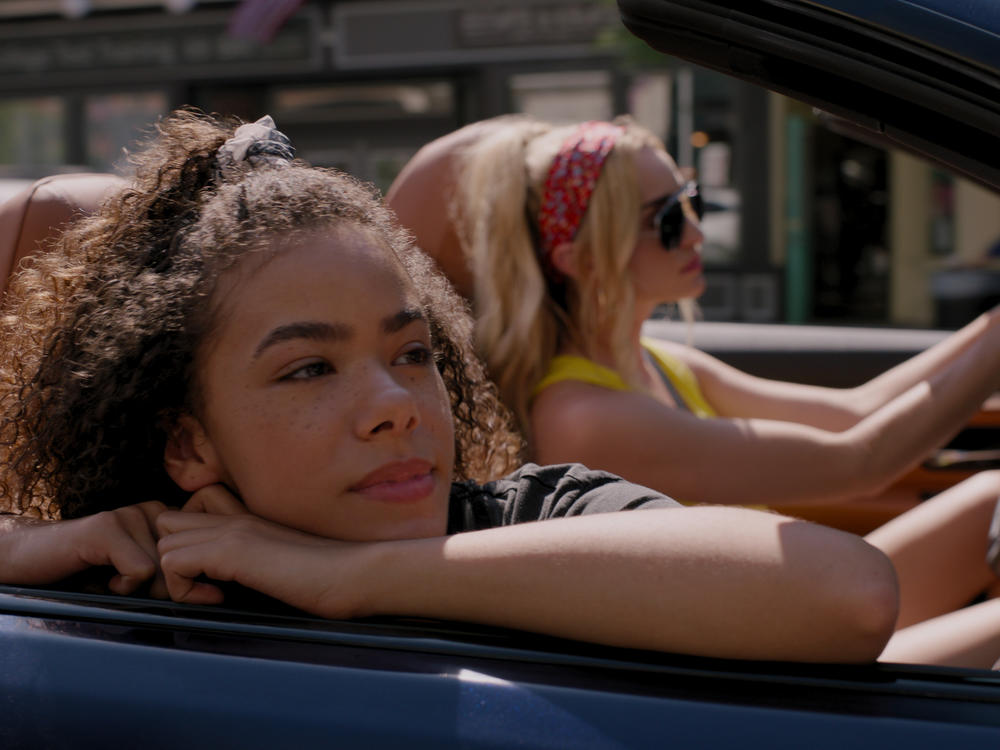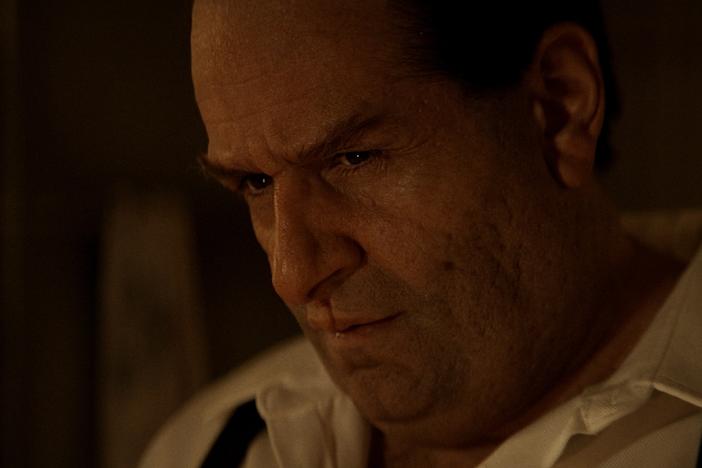Section Branding
Header Content
'Ginny & Georgia' Has Trouble Getting Georgia Out Of Ginny's Way
Primary Content
To understand the challenge presented by the new Netflix series Ginny & Georgia, it helps to know a little bit about Melrose Place.
There was a moment in the fourth season of Melrose Place when a person who seemed dead turned out not to be dead. The notion that he seemed dead was signaled by his impromptu extremely unlicensed burial, performed under cover of darkness by two series regulars in dark coats and black knit hats (natch). The fact that he was nevertheless not dead was signaled when, mere seconds after they drove away, his clawlike bare hand emerged from the soil, dirty and desperate for freedom. And, presumably, revenge, since the living tend to resent being buried.
You have to be making a certain kind of show to do a scene like this, incorporating as it does the well-worn horror trope of not only the undead, but the filthy-fingernailed grave escape. And originally, Melrose Place was not that show. It began as the adult Beverly Hills 90210, a fairly tame network soap about young folks starting out in L.A., making their way in writing or fashion design or teaching cardio-funk classes, dealing with IOTD (Issues Of The Day) like pregnancy and AIDS and why women suddenly decided they should wear chokers and baby-doll dresses all the time. But by the time this happened, it was that show. It had gradually incorporated high-octane soap standards like amnesia, temporary blindness, secret identities, blackmail, sexy hit men, imaginary pregnancy, truth serum, and a caricature of a terrifying mental hospital that seemed like it came out of a campfire ghost story.
Here's the thing: Drama comes in different flavors, and it's exceedingly difficult to do them all at the same time. Once you have the hand coming out of the grave, it's hard to go back and do the earnest storyline about sexual harassment or the serious implications of dating a single parent, both Melrose Place season-one stories. This is also a pitfall stumbled into by no lesser a show than Friday Night Lights, by the way, when it followed a near-perfect first season that was intimate and naturalistic with a disastrous story about violence that was absurd and sensationalized — but which might have worked just fine on a completely different show.
A lot of early reactions to what folks saw of Ginny & Georgia noted that it looked a lot like Gilmore Girls: a very young single mom, a teenage daughter, perhaps more like sisters than mother and daughter, starting a new chapter together, and so forth. And ... superficially, yes. It is indeed about a mother and a daughter making it on their own in a town that has its own gossip and secrets. But beneath the thinnest surface layer, it's not really that at all; it's a hybrid of two dramatically different styles.
One is a quite serious (and often thoughtful) show about 15-year-old Ginny (Antonia Gentry) making choices about the beginning of her sex life, her biracial identity (Georgia is white; Ginny's father is Black), and her friendships. The other is a far more out-there show about Georgia (Brianne Howey), a self-styled southern beauty whose wealthy husband dies at the beginning of the series and who turns out to have a closet full of the coolest clothes and the dustiest skeletons. Neither half is as warm and light as Gilmore Girls was.
Creator Sarah Lampert has talked about wanting to make a "grounded show with real teenagers, real emotions, and honesty." Showrunner Debra J. Fisher has said that they wanted to make a "fun, feel-good ride." These things aren't necessarily incompatible, but tonally, they feel different. And there's still something missing from "feel-good ride" as a description of Georgia's half of the show. There should be no guilty pleasures unless there's harm being done, but if you described the "feel-good ride" parts as instead "guilty pleasure" parts, you'd get closer to giving people an idea of what to expect.
The show is a strange feat of joinery, but not because it's uncertain. It feels sure-footed and intentional, just a little confusing, like seeing the front of a car welded securely and competently to the back of a boat. Parts of it are a wacky good time, and those parts come from the over-the-top Georgia stories. And parts of it are quite strong as discussions about how hard it is to be 15, and those parts come from the Ginny stories.
What Gentry is doing with the character of Ginny is the series' greatest strength; she's mastered the maddening combination of bravado and terror that is so much a part of adolescence for so many people. Particularly when it comes to sex, this is as good a representation as I've seen of the fact that a teenage girl can be horny and scared and inconsiderate and sensitive and curious and hesitant. The things teenagers do to each other can seem just brutal in retrospect — even the good ones. Ginny & Georgia respects the fact that to Ginny and her friends (especially her instant bestie, Max, played by Sara Waisglass), these slights and shifts are extraordinarily important, even the ones that may one day seem like potholes they fairly easily bumped right over. In these moments, it recalls shows like My So-Called Life and Everything Sucks!, which treat the feelings of teenagers as inherently worthy of attention, when they're experiencing serious difficulties and even when they're not.
The parts of Ginny's story that specifically address race are, like a lot of addressing of race on television, a bit hit-and-miss to my ear (not that my fully-grown-white-person ear is the most relevant one in this respect). There are some smart conversations — and one agonizing one — between Ginny and Hunter (Mason Temple), who's half-Taiwanese and, like her, sometimes unsure how he wants his friends to react to that or ignore it. But there's also some stuff that feels forced — I wish Bracia (Tameka Griffiths), a Black girl Ginny meets at school, had a fuller story. As it stands, the writing turns to her only for the purposes of Ginny's exploration of her identity. While Ginny's interactions with Hunter smartly explore how race is part of a relationship between two people where there's a lot going on, her relationship with Bracia feels like a device for covering territory efficiently (despite an appealing performance from Griffiths — more Bracia in season two!).
Part of the reason some things feel rushed in this way, I suspect, is that there's just too much going on here for these ten episodes (all of which are stuffed nearly to the full-hour gills, unlike many Netflix "hours"). Without spoiling anything, it's impossible to fully elaborate, but imagine a show that was about fishing AND painting AND aliens AND horses AND how to fix cars AND the Old West AND a puppy AND robots AND spies AND how a bill becomes a law. At some point, you throw up your hands and realize that some things are going to get short shrift. At some point, they're going to say, "Because Congress said so, that's why."
One of the things that comes up short here, unfortunately, is the writing behind the character of Georgia. As specific and complicated as Ginny is, Georgia is much, much flatter. Most of the efforts to develop her character come from revelations about childhood trauma she suffered, which don't paint a rich portrait of a person, exactly, even if they inspire sympathy for her. Ginny is such a flesh-and-blood character, such a real kid you might meet at a school or a coffee shop, while Georgia never stops feeling like an exaggerated character held at a slight ironic distance who's come from somewhere campier. She gets a love interest, played by Scott Porter (who was in Friday Night Lights!), but in her relationship with him, too, it always seems a bit like they're in different shows. His is quieter; hers might well feature a guy coming back from the dead.
One other caution: Netflix is rapidly inspiring what you might call The Chump Test, which evaluates shows that last only one season on the basis of whether, if there is never another season, you'd feel like a chump for watching all ten hours only to be left hanging. Be aware that while Ginny & Georgia passed the Chump Test for me — pleasurable enough in the Ginny sections that I wasn't irate about the unfinished story threads — this is not a closed story. It is a season that begs for another season. Your Chump Test mileage may vary.
The clashing styles here complicate the calculus in general. There is no rule that a show has to be all one thing; look at the success of WandaVision. But when you smack together different styles and different tones this roughly, it's not enough for it to be intentional; it has to be purposeful. Otherwise, what's broad keeps yanking you away from what's intimate, and what's quiet keeps dampening the fun of what's loud. Ginny's very real world and Georgia's very heightened one might both be fun, but because the former is much more successful and better executed, the latter starts to feel like marking time.
Copyright 2021 NPR. To see more, visit https://www.npr.org.
Bottom Content



